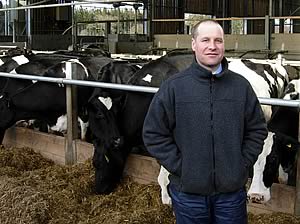|
20/03/07
North west based animal nutrition company, New Breed UK, is
taking advantage of the latest research findings in dairy cow
fertility and utilising a new programme to assist in its diet
formulation and advisory work with producers.
New Breed’s director Mark Borthwick
 |
“The UK continues to see a year on year decline in dairy
cow fertility at the expense of increased production,” says
New Breed’s director Mark Borthwick. “Often this
increase in production is in the 305 day lactation yields, yet
milk sold per cow per year is declining. This drop in annual
milk production and losses associated with poor fertility is
costing producers dearly.”
New Breed is adopting a new fertility programme called the Future
Fertility Index that has been developed with specialist animal
nutrition company SCA NuTec who work closely with the company.
SCA NuTec was one of the sponsors of a recent industry and Defra
funded fertility research project at the University of Nottingham
and it has used these results, plus its own research, to develop
the new fertility programme.
The Future Fertility Index has been embraced by New Breed’s
team of nutrition advisers. It uses individual cow data and production
records to help identify the ‘weakest link’ in the
herd’s fertility. The programme provides three key fertility
indexes for each herd; a cycling index, embryo quality index
and implantation index.
“These indexes are like benchmarks,” says SCA NuTec
ruminant manager Sion Richards. “If a cow doesn’t
come bulling she will have a low cycling index – if she
doesn’t conceive then embryo quality might be below par
or if she doesn’t hold to service then perhaps implantation
isn’t good.”
New Breed has worked with SCA NuTec to develop unique diets to
overcome the weak areas that are identified. “Cows with
delayed bulling indicate more energy and insulin is needed in
the diet,” adds Dr Richards.
“Carefully evaluating and enhancing the sources of energy
in the diet has been shown to increase bulling activity.
“A reduction in liver function – often seen when
cows transit from the dry period to early lactation – will
reduce insulin, so improved dry cow feeding to overcome this
is advised too.”
Moving on, poor embryo quality is associated with dietary energy
that does not stimulate progesterone production. Ensuring adequate
saturated fat and good liver function will help stimulate progesterone.
The level of fermentable energy sources should be relatively
low at this stage too, to minimise insulin production. Insulin
has a detrimental affect on embryo quality.
The Future Fertility Index will predict levels of progesterone
from insulin and cow intake.
For herds where poor implantation of embryos is suspected – where
cows are not holding to service – the production of the
naturally occurring hormone prostaglandin F2α should be
reduced.
“The key is to evaluate where the fertility issues are
and target these,” adds Mr Borthwick. “Then we can
modify the diet accordingly.
“New Breed has invested in the programme as part of its
commitment to helping producers improve cow performance and it
will complement our very practical approach to cow feeding. The
Future Fertility Index programme, in conjunction with more than
200 combined years’ of ‘cow walking’ experience,
is making New Breed the fastest growing ruminant knowledge company
in UK.”
For more information contact Mark Borthwick on 07795 553332
 Dalfibble
Holstein Dispersal Sale Dalfibble
Holstein Dispersal Sale
 Customer Service Key to New Semex Appointments Customer Service Key to New Semex Appointments
 UK Storm Hits Europe UK Storm Hits Europe
|


